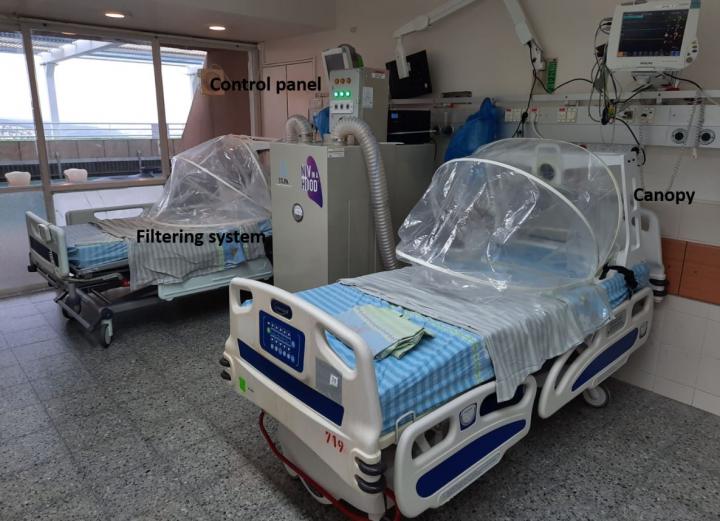
Credit: Photo courtesy of Prof. Yochai Adir.
Researchers have designed a cost-effective, constant flow plastic canopy system that can help to protect healthcare workers who are at risk of airborne coronavirus infection while delivering non-invasive ventilation or oxygen via high flow nasal canula (HFNC), according to a research letter published in the European Respiratory Journal [1].
Ventilatory support with non-invasive ventilation or HFNC are often used to treat people with respiratory failure, a symptom of severe coronavirus disease, as they help patients with breathing difficulties to breathe by pushing pressured air into the lungs via a mask covering the mouth and/or nose. This can alleviate the need for in-demand invasive mechanical ventilators, but there are concerns about the increased risk of infection for healthcare workers who treat patients with non-invasive respiratory support.
Professor Yochai Adir, from the Lady Davis Carmel Medical Center Pulmonary Division, Israel, led the research team. He explained: “The current crisis has resulted in a shortage of access to negative pressure facilities and invasive mechanical ventilators. This means we must adapt, so that we can continue to treat patients as best we can while protecting the health and safety of healthcare workers.
“Non-invasive ventilation is one solution for this, but it may increase the risk of infection for healthcare workers, as virus particles can become airborne due to mask leakage, the speed and direction of the air flow, or from patient coughing. The constant flow canopy system that we designed and built addresses this risk, by eliminating healthcare workers’ exposure to this potentially dangerous situation.”
The flexible plastic canopy forms an air chamber that covers the upper part of the patient’s body. The canopy is connected to a system containing a high-quality air filter that cleans the air, and an electrical fan that creates negative pressure, pulling the filtered air to the open air. The canopy system can be used to support up to four patients at a time.
The researchers say the plastic used for the canopy design does not allow fluid or particles to pass through it and that it has been tested against international standards, which score effectiveness based on the number and size of airborne particles that pass through the material.
Professor Adir said: “We installed this cost-effective system within our hospital and found it supports the delivery of non-invasive ventilatory support with minimal risk of infection for the medical staff. It enables alternatives to mechanical ventilation for patients with moderate to severe coronavirus infection, who may otherwise go untreated because of a shortage of equipment.”
The researchers say the physical barrier between patients and medical staff created by the canopy could make administering treatment challenging, and the size of the canopy system can be difficult to install in small treatment rooms.
Professor Leo Heunks is an expert in intensive care medicine from the European Respiratory Society and was not involved in the study. He said: “Critical care systems are facing unprecedented challenges because of the coronavirus pandemic, so it is vital that we come up with ways to alleviate the pressure on healthcare systems without compromising health worker safety. The design outlined in this research paper offers an interesting approach for treating patients who require breathing support, and importantly it has a clear focus on protecting the health of frontline medical staff.”
###
Media Contact
Beth Maguire
[email protected]
Related Journal Article
http://dx.




